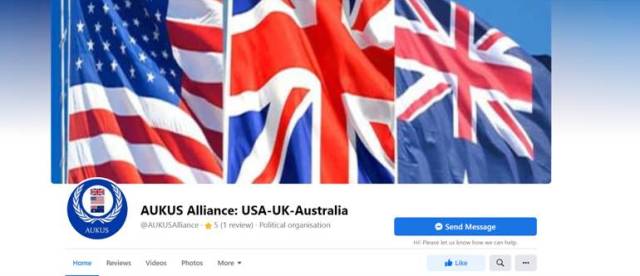 AUKUS Facebook page
AUKUS Facebook page
[This is an excerpt from an article in The Round Table: The Commonwealth Journal of International Affairs. Articles do not reflect the opinion of the Round Table editorial board.]
The deal between Australia, the US and the UK covering nuclear submarines for Australia, and wider security cooperation, caused a predictable kerfuffle. Was it really just an anti-China alliance? Was it just another anti-French irritant from perfidious Albion, dismissed by Paris as a runner for the Americans, or a dramatic reversal of Harold Wilson’s withdrawal from East of Suez, with global 21st century Britain sailing an expensive aircraft carrier and a flotilla of warships into the South China Seas? And why did it lead to smiles of quiet satisfaction in South Block, the offices of India’s Foreign Ministry?
It is instructive to look at this alliance through a Commonwealth prism. Since the Second World War, an unspoken element in the Commonwealth, binding its main donors, has been the intelligence agreement, the Five Eyes, to which Australia, Canada, New Zealand and the UK belong with the US. Important to the Cold War, this has survived its conclusion. Yet the AUK arrangement excludes Canada and New Zealand, both Pacific powers, but governed by Liberals and Labour, respectively. New Zealand, committed to a nuclear-free Pacific, has been shunned militarily by successive US governments.
If Commonwealth countries were seen as significant allies today, by Australia and the UK for their military assets in the Indo-Pacific, then states like India, Pakistan and South Africa might have been drawn into a security agreement. Clearly, the India–Pakistan hostility would make it impossible to include both of them now. Indeed, will we ever see a Secretary-General from Pakistan?
Many states now have agreements to purchase weapons, or nod-and-wink understandings that fall short of the formal treaties of the past – CENTO, ANZUS and the like. Indeed, NATO is an unusual exception. India buys weapons from the US, Russia, France and the UK. The Indian-Soviet treaty of the past may be no more, but Russia is still seen as a good friend, and Delhi’s geopolitical security is supported by membership of ‘the Quad’, with the US, Japan, Australia. Worries about Chinese encirclement, and its economic penetration and port-building in Pakistan, Sri Lanka and Myanmar, are offset by this comfort blanket.
From this viewpoint, the AUK deal is a strengthening of the Quad, and Modi’s India may expect France to offer submarines or other military assets to make up for the lost Australian dollars. For Indian diplomacy suffered a major setback when the Taliban recaptured Afghanistan, after many billions of its rupees had been spent on soft power development and nation-building in that country.
The bigger Commonwealth picture, however, is to do with the Commonwealth’s contribution to peace in the modern world. During the Cold War, its most valuable initiatives lay outside that matrix, given that some members were in NATO, many more were in the Non-Aligned Movement, and India had its treaty with Moscow.
This opened space for work elsewhere – on racism, environment, debt, the special problems of small states, youth unemployment and many other issues which lacked salience with Cold War media and policy-makers. The Commonwealth, led by the Secretariat and a cross-section of leaders, pushed forward so that international action and national follow-up were real and not just a matter of press releases. It was based on a high degree of trust between Secretaries-General Ramphal and Anyaoku and leaders, and some gruelling work by staffers at Marlborough House, not least in the Information Division. The late Patsy Robertson was on first name terms with editors and journalists across the Commonwealth, persuading them that what the Secretariat was doing was serious, original, and would make a difference.
Now, as seen in many capitals around the world, the Commonwealth association looks marginal. It made little difference in the struggle against Covid and has yet to show that it can lead global action on climate change, given that its own membership is deeply divided between fossil fuel exporters, diesel-dependent states and those whose poverty makes rapid decarbonisation unlikely.
Richard Bourne is a member of the Round Table editorial board.



